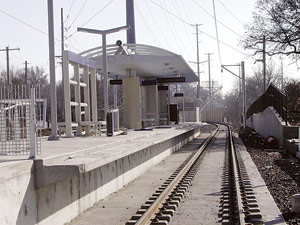 |
| Off Schedule. The light rail project, scheduled to be completed in spring 2005, will arrive a year late. (Photo courtesy of St. Louis Metro) |
In trying to win over $50 million in damages from the original engineering and construction management team on the St. Louis light rail system extension, Larry Salci says he intends to show more than design errors. Salci, the system’s CEO, intends to show that the team—which includes Parsons Brinckerhoff, New York City, and Jacobs Engineering, Pasadena, Calif.—committed fraud.
To recover cost overruns on the troubled project, Salci will need to prove fraud. Liability for former design and construction management team Cross County Collaborative is capped at $8 million. Salci says the limit is because of professional errors and omissions insurance, but CCC says the limit is contractual. Proving fraud would get past these contractual and insurance limitations.
Completion is over a year late and the cost of the eight-mile extension is now tabbed at $550 million, putting the project about $150 million over early estimates. Salci’s Bistate Development Agency, whose transportation system is called Metro, terminated the team and sued in late 2004 in St. Louis County court for damages based on negligence, breach of contract, tortious interference and fraud. The case is not scheduled for trial until January 2007.
 |
|
SALCI (Photo courtesy of St. Louis Metro) |
In addition to PB and Jacobs, CCC includes Douglassville, Pa.-based STV Inc., and Kwame Building Group, St. Louis. CCC has countersued for wrongful termination, breach of contract and unfair competition based on Metro’s hiring of CCC’s former employees.
CCC says Metro’s fraud claims are baseless. It notes that Judge Carolyn Whittington already has dismissed several Metro claims. “The fraud claims and the high-profile media and political assaults...go well beyond the normal course of settling disputes,” says a CCC spokesperson. CCC Attorney Richard Hardcastle notes that Metro rejected the judge’s request that the case go to alternative dispute resolution.
Both sides say alignment changes added to the costs. CCC adds that there were numerous changes and that “running segments of the alignment underground, and elevating other segments above grade, accounted for some of the more costly changes.”
To recover more than contractual damages, Metro says it can prove CCC committed fraud by claiming in December 2002 that its work was done and ready for bidding. “We went to bid in January 2003 and by spring and summer contractors started bringing back all kinds of omissions, material tables, wrong specs,” claims Salci. Project completion, which had been set for spring 2005, has slipped to spring 2006.

Post a comment to this article
Report Abusive Comment